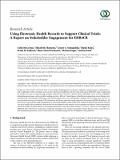Files in this item
Using electronic health records to support clinical trials : a report on stakeholder engagement for EHR4CR
Item metadata
| dc.contributor.author | McCowan, Colin | |
| dc.contributor.author | Thomson, Elizabeth | |
| dc.contributor.author | Szmigielski, Cezary A | |
| dc.contributor.author | Kalra, Dipak | |
| dc.contributor.author | Sullivan, Frank M. | |
| dc.contributor.author | Prokosch, Hans-Ulrich | |
| dc.contributor.author | Dugas, Martin | |
| dc.contributor.author | Ford, Ian | |
| dc.date.accessioned | 2018-02-27T11:30:06Z | |
| dc.date.available | 2018-02-27T11:30:06Z | |
| dc.date.issued | 2015 | |
| dc.identifier | 249969478 | |
| dc.identifier | bb81a0d6-9d77-4e9f-834c-ba2b3f4779a4 | |
| dc.identifier | 26539523 | |
| dc.identifier | 84945957227 | |
| dc.identifier.citation | McCowan , C , Thomson , E , Szmigielski , C A , Kalra , D , Sullivan , F M , Prokosch , H-U , Dugas , M & Ford , I 2015 , ' Using electronic health records to support clinical trials : a report on stakeholder engagement for EHR4CR ' , BioMed Research International , vol. 2015 , 707891 . https://doi.org/10.1155/2015/707891 | en |
| dc.identifier.issn | 2314-6133 | |
| dc.identifier.other | PubMedCentral: PMC4619877 | |
| dc.identifier.other | ORCID: /0000-0002-6623-4964/work/33508497 | |
| dc.identifier.uri | https://hdl.handle.net/10023/12797 | |
| dc.description | The research leading to these results has received support from the Innovative Medicines Initiative Joint Undertaking under grant agreement number 115189, resources of which are composed of financial contribution from the European Union’s Seventh Framework Programme (FP7/2007–2013) and EFPIA companies’ in kind contribution. | en |
| dc.description.abstract | BACKGROUND: The conduct of clinical trials is increasingly challenging due to greater complexity and governance requirements as well as difficulties with recruitment and retention. Electronic Health Records for Clinical Research (EHR4CR) aims at improving the conduct of trials by using existing routinely collected data, but little is known about stakeholder views on data availability, information governance, and acceptable working practices. METHODS: Senior figures in healthcare organisations across Europe were provided with a description of the project and structured interviews were subsequently conducted to elicit their views. RESULTS: 37 structured interviewees in Germany, UK, Switzerland, and France indicated strong support for the proposed EHR4CR platform. All interviewees reported that using the platform for assessing feasibility would enhance the conduct of clinical trials and the majority also felt it would reduce workloads. Interviewees felt the platform could enhance trial recruitment and adverse event reporting but also felt it could raise either ethical or information governance concerns in their country. CONCLUSIONS: There was clear support for EHR4CR and a belief that it could reduce workloads and improve the conduct and quality of trials. However data security, privacy, and information governance issues would need to be carefully managed in the development of the platform. | |
| dc.format.extent | 8 | |
| dc.format.extent | 1161649 | |
| dc.language.iso | eng | |
| dc.relation.ispartof | BioMed Research International | en |
| dc.rights | Copyright © 2015 Colin McCowan et al. This is an open access article distributed under the Creative Commons Attribution License, which permits unrestricted use, distribution, and reproduction in any medium, provided the original work is properly cited. | en |
| dc.subject | R Medicine (General) | en |
| dc.subject | ZA4050 Electronic information resources | en |
| dc.subject | NDAS | en |
| dc.subject.lcc | R1 | en |
| dc.subject.lcc | ZA4050 | en |
| dc.title | Using electronic health records to support clinical trials : a report on stakeholder engagement for EHR4CR | en |
| dc.type | Journal article | en |
| dc.contributor.institution | University of St Andrews.School of Medicine | en |
| dc.contributor.institution | University of St Andrews.Population and Behavioural Science Division | en |
| dc.identifier.doi | 10.1155/2015/707891 | |
| dc.description.status | Peer reviewed | en |
This item appears in the following Collection(s)
Items in the St Andrews Research Repository are protected by copyright, with all rights reserved, unless otherwise indicated.

